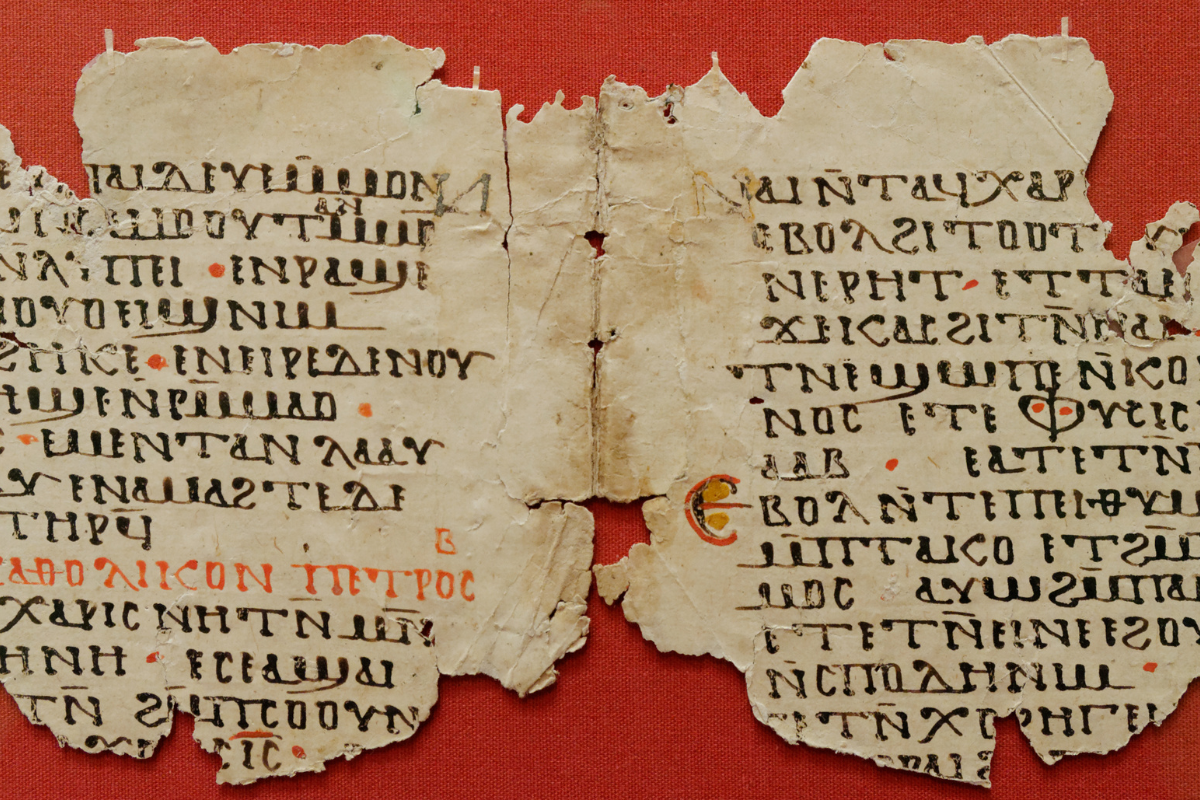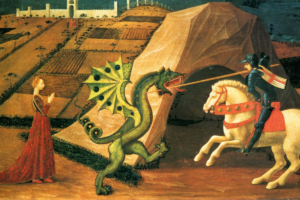The Coptic language is the last development stage of the ancient Egyptian language. The Coptic language appeared around 100 B.C., it’s the same meanings and pronunciation as the ancient Egyptian language, however, it’s Written in Greek letters. The Coptic language was the language of the people and it remained so even when Egypt was under the rule of the Roman Empire and the spread of the Greek language all over the world. The Egyptians spoke the Coptic language until the Arabs entered Egypt, and this was the turning point in the history of the Coptic language. The Arab rulers found the Coptic language was an obstacle for them to communicate with the Egyptians and they wanted to impose the language of the Quran. However, the Egyptian people continued to speak the Coptic language among themselves and in their daily lives until the twelfth century. The Coptic language repelled all attempts of Arabization and Islamization for a long time, but it could not survive at the end, and confined and used only as the liturgical language of the Coptic Church in Egypt. In this paper we will argue about these reasons that led to the weakness and disappearance of the Coptic language due to Arabization and Islamization attempts.
The Arab Conquest of Egypt
We note that the Egyptians did not leave their Coptic language immediately after the Arab conquest of Egypt, “Coptic continued to be used by the Christian population and remained the sole language of the Church for at least three centuries”.[1] The Arabic language was not used at that time among the Egyptians, and it was limited only to Muslim colonists to Egypt and the rulers.[2] The Egyptians initially welcomed the Islamic conquest of Egypt, believing that this would save them from the rule of the Byzantines. But they soon realized that this Arab conquest was an invasion and colonization for the Egyptians. The Arabs overthrew all those who stood in their way, and the major part of the persecution was for the Coptic language, because the language was the only obstacle for the Arab conqueror to take control over the country. We can say that the Copts of Egypt did not give up and leave the Coptic language quickly until the twelfth or the thirteen centuries[3], as the Arabic language became the dominant among the Egyptians in general.
Dīwān (bureaucracy) Arabization
One of the most important factors that had a major role in weakening the Coptic language is the Dīwān (bureaucracy) Arabization by the governor Abd al-Malik ibn Marwan in A.D. 706. It was natural for Arabs to prefer using their language for understanding, rather than using translators to avoid cheating and dishonesty. So, the governor Abd al-Malik ibn Marwan ordered the prevention of the Coptic language in Dīwāns and using Arabic instead of it.[4] This sudden coup against the Coptic language can only be explained by the methodology of working to weaken the Coptic nationalism of the Egyptians to empower the Arabs. After the Arabic language has become the official language in the Dīwāns, this has helped to reduce the influence of the Copts after their positions were transferred to the hands of Arab Muslims. As a result of the amendment in the local bureaus, whether in terms of language or in terms of employees who work in these bureaus, all of this weakened the Coptic language.
Massive Religious Conversions
The Copts suffered severe persecution throughout the Arab rulers. Many Copts could not stand up to this persecution, resulting in massive religious conversions in huge numbers. These conversions affected the Coptic language due to low number of Christians because of persecution. For example, one of the persecutions the Coptic faced and had a negative influence in the Coptic language was in the 12th century A.D. The ruler Al-Hakim bi-Amr Allah A.D. 996-1020 prohibited the use of the Coptic language in roads and homes. Sawirus Ibn Al-Muqaffa’ mentioned in his book “History of the Patriarchs of Alexandria”[5] many details about the persecution of the Christians in the period of rule Al-Hakim bi-Amr Allah. He became like a lion roaring and asking for prey and becoming a lover of bloodshed. Sawirus Ibn Al-Muqaffa’ adds that the final blow that the Coptic language received during his rule was the end of the Pharaohs’ language, as he issued strict orders to completely nullify the use of the Coptic language in the daily life. He Issued strict orders to forbid the speaking or uttering of the Coptic language in the streets, markets and other public places, and to punish anyone who speaks it by cutting his tongue.[6]
Coptic language reformation attempts
Interest in the Coptic language gradually weakened in Egypt after the decision to Arabize the bureaucracy by the governor Abd al-Malik ibn Marwan. That’s why Pope Gabriel II of Alexandria (1131-1146) issued a decree permitting reading of the Gospels and sermons in Arabic after they were originally recited in the Coptic. Therefore, he is considered the first patriarch to allow the liturgy to be prayed in the Arabic language. Then many Christian theologians attempted to write and translate the Bible into Arabic. All this was the reason for the continuation of the Christian faith, despite all the difficulties the Coptic faced.
Finally, The Coptic language was an essential part of the culture and life of all Egyptians. But attempts to Arabization and Islamization, which the Coptic language struggled with, weakened and led it to be trapped inside the churches, and to be used only in the Church Liturgy. As we have explained in some of the reasons which weakened the Coptic language, it did not collapse in a day and a night, it took many years for the Egyptians to change their main language from Coptic to Arabic language. We could understand this transformation though H Richard Niebuhr in his book “Christ & culture”[7] which provides different models of how the Christians deals with the culture. At first, the Egyptians were against the culture of Arabization and Islamization that was forced upon them. Then they found themselves in Paradox with government language and their sacred language, which they used, in their churches. Although the Copts eventually surrendered to use the Arabic language by imposing force over them, they succeeded to make a great transformation of the Arabic culture. This happened through the contributions of Egyptian and Arab Christians by enriching Christian translations into Arabic and Copto-Arabic literature. The Arabic language has become the language of the believers, today more than twenty million Egyptian Christians is using the Arabic language and praying through it in their churches.
BIBLIOGRAPHY
- Richard, Niebuhr. Christ & Culture. New York: Harper Collins World, 2003.
Ibn Al-Muqaffa’, Sawirus. History of the patriarchs of the Coptic Church of Alexandria. Paris: Firmin-Didot, 1948.
Moawad, Samuel. “Coptic Arabic Literature When Arabic Became the Language of Saints.” In The Coptic Christian Heritage: History, Faith and Culture, edited by Lois M. Farag. New York, NY: Routledge, 2013.
Rubenson, Samuel. “The Transition from Coptic to Arabic.” Égypte/Monde arabe,Première série (July 2008), https://doi.org/10.4000/ema.1920 (accessed March 2, 2020): 77-92.
[1] Samuel Rubenson, “The Transition from Coptic to Arabic,” Égypte/Monde arabe,Première série (July 2008), https://doi.org/10.4000/ema.1920 (accessed March 2, 2020): 77-92.
[2] Ibid.
[3] Ibid.
[4] Samuel Moawad, “Coptic Arabic Literature When Arabic Became the Language of Saints,” in The Coptic Christian Heritage: History, Faith and Culture, ed. Lois M. Farag (New York, NY: Routledge, 2013), 15.
[5] Sawirus Ibn Al-Muqaffa’, History of the patriarchs of the Coptic Church of Alexandria (Paris: Firmin-Didot, 1948).
[6] Ibid.
[7] Niebuhr, H. Richard, Christ & Culture (New York: Harper Collins World, 2003).




